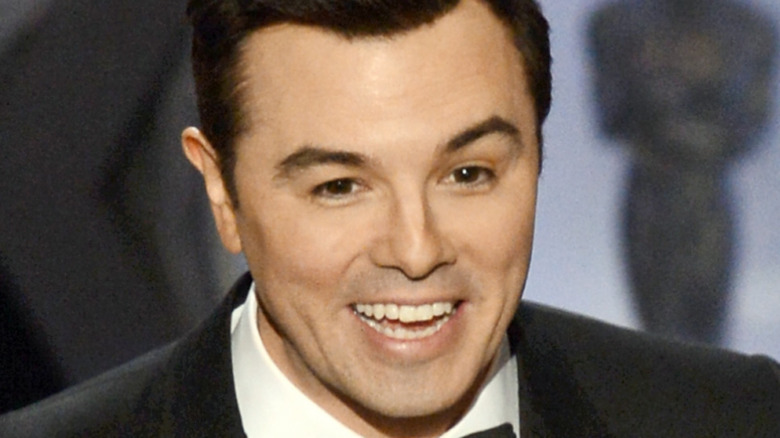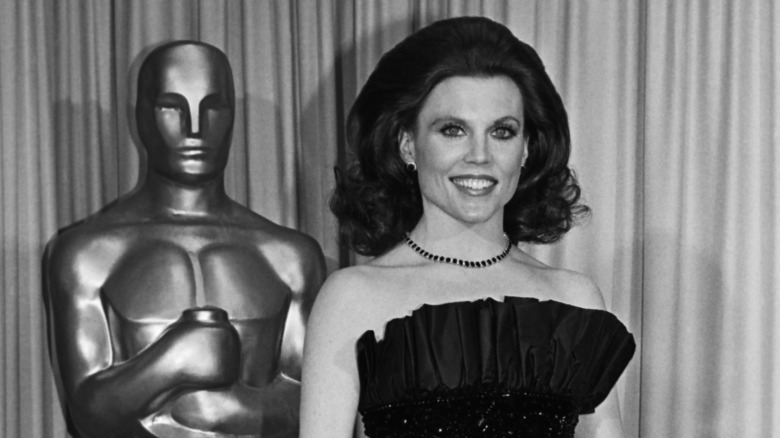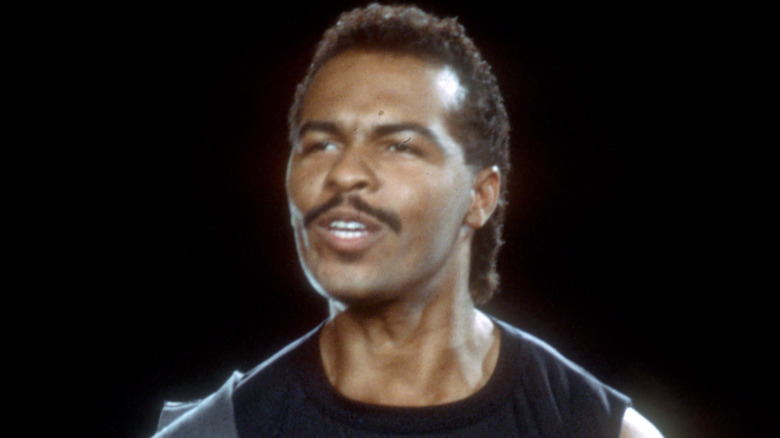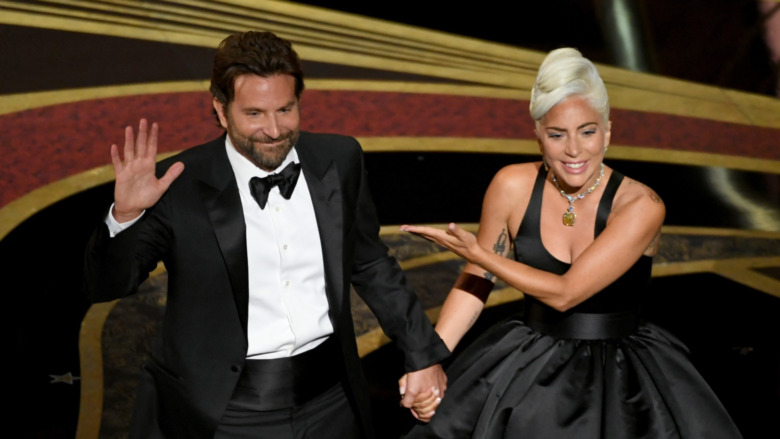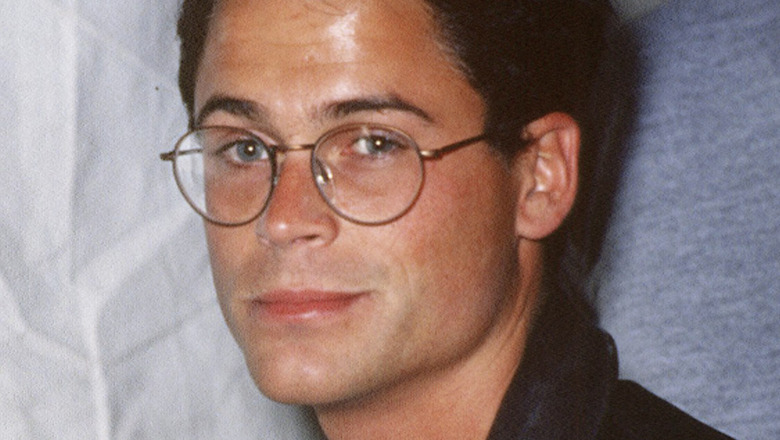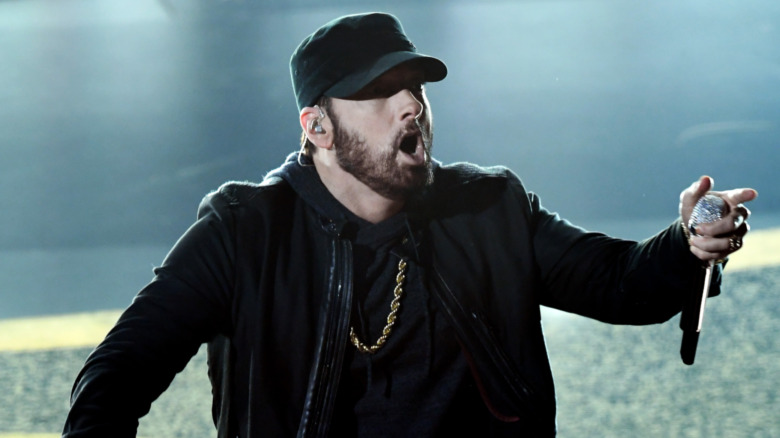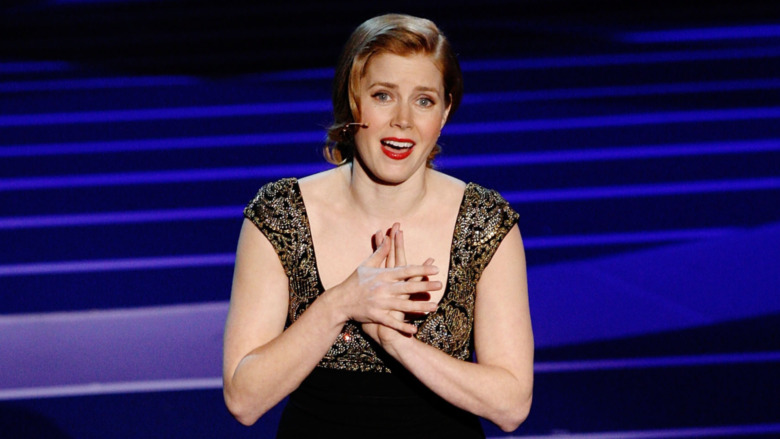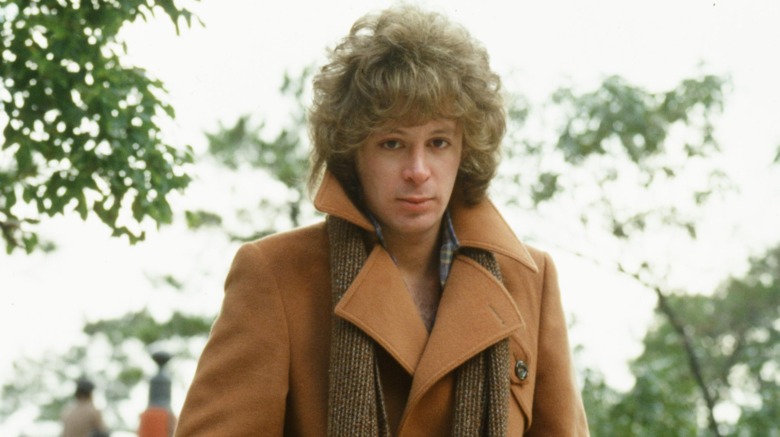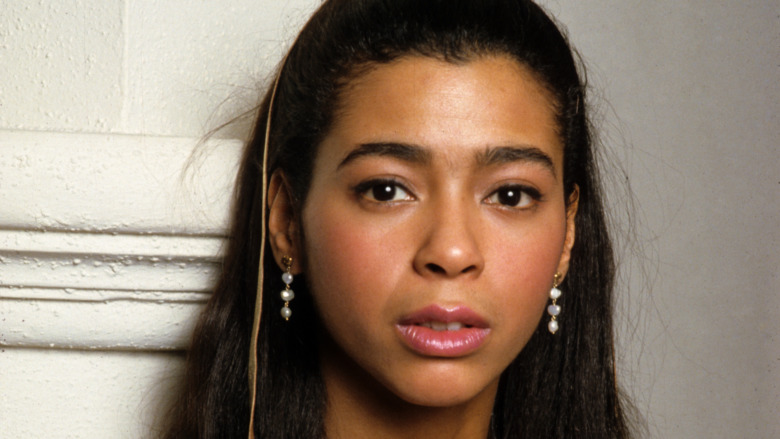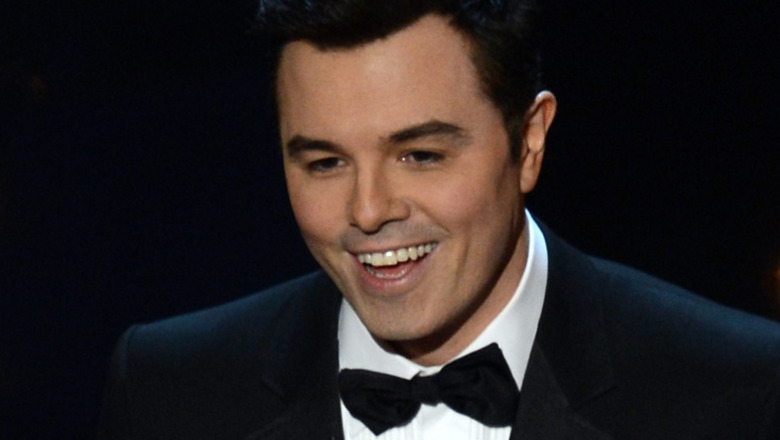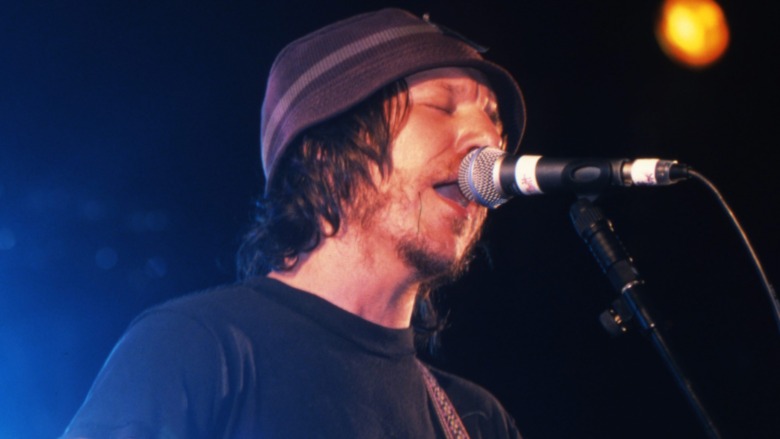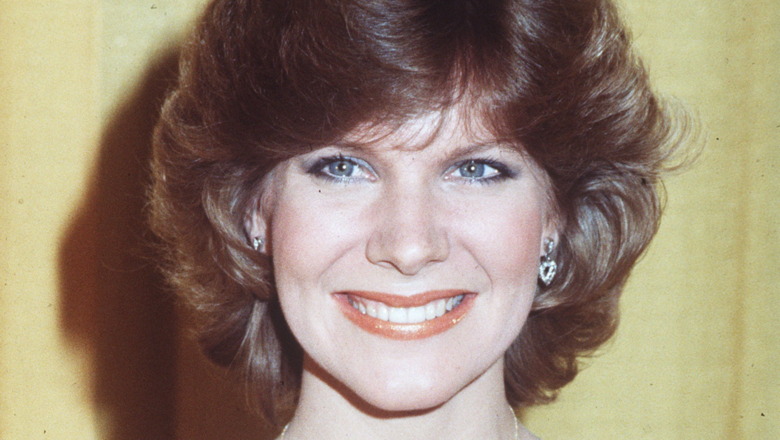The Weirdest Ever Musical Performances At The Oscars
While the host, tone, nominees, and venue may occasionally change, there are certain inevitabilities viewers can expect from the annual broadcast of the Academy Awards. There will almost certainly be tearful acceptance speeches, the orchestra playing off and drowning out the non-tearful acceptance speeches, and a whole bunch of musical numbers.
As a way to break up the show so it's not just presenter, trophy hand-off, speech over and over again, producers grind the show to a halt so that professional musicians may sing a little song and maybe have a little dance. Usually, the tunes performed at the Academy Awards are the nominees for Best Original Song, along with an accompaniment to the "In Memoriam" montage, and also an opening or closing number. Some wonderful TV moments have come out of this Oscars broadcast tradition, as well as some others that have gone down in Academy Awards history as strange, odd, off-putting, or just plain wrong. Here are the weirdest ever musical moments from the Oscars.
Ann Reinking stepped in for Phil Collins
In 1985, Phil Collins earned his first Academy Award nomination for Best Original Song for "Against All Odds (Take a Look at Me Now)," a ballad from the drama "Against All Odds" that was also his first single to hit #1 on the Billboard Hot 100. A personal triumph two times over, Collins was so excited that, according to the Collins biography "Turn it On Again," he contacted the Academy of Motion Picture Arts and Sciences and volunteered his services to sing his song on the Oscars broadcast. However, the Academy said no to one of the biggest pop stars on the planet performing his chart-topping single, because the show had already hired Ann Reinking to perform "Against All Odds (Take a Look at Me Now)."
Make no mistake, Reinking was a talented performer, but she wasn't a pop singer — she was one of Broadway's most notable actors and dancers in the 1970s and 1980s in productions like Chicago, A Chorus Line, and Sweet Charity. But the Academy sent a terrified-looking Reinking out to sing Collins' song. Well, she lip-synced the first part of it, because for a lot of the time allotted to "Against All Odds," Reinking brought in a partner for a lyrical, ballet-influenced modern dance routine that played over her own pre-recorded vocal take on the song. "She was awful," Collins later told Playboy (via "Turn it On Again"). "I felt sorry for her."
Something weird in the neighborhood for this Ghostbusters number
Ray Parker, Jr. scored a No. 1 hit in 1984, one of the most inescapable songs of the year because it came from the year's highest-grossing movie: "Ghostbusters." It's fair to say that most of the United States was extremely familiar with the movie "Ghostbusters" and Parker's single of the same name by the time the latter earned an Academy Award nomination for Best Original Song. And yet, when Parker performed the smash on the 1985 Oscars telecast, producers threw out all the imagery associated with the song and even its familiar sound for a bonkers production. Parker took the stage in an orange jumpsuit and rode around on a lime-green forklift for some reason, apparently trying to get some work done in a haunted warehouse. As he tries his best to sing along to an inexplicably sped-up track that wasn't the original backing music and without its distinctive multi-tracked background singers (the ones who shout "Ghostbusters!"), he's pestered by some ghosts who swing around their flowing outfits and scarves like they were in a Broadway production.
At least the Ghostbusters make a cameo ... well, not really. Three guys who look nothing like Dan Aykroyd, Ernie Hudson, Bill Murray, or Harold Ramis bust through a fake brick wall and chase after the ghosts while dressed in blue superhero outfits (not Ghostbusters jumpsuits) and shoot laser guns at the dancing ghosts.
Lady Gaga and Bradley Cooper went deep on Shallow
Lady Gaga was nominated for Best Original Song (and won) at the 2019 Academy Awards for "Shallow," the powerful and stirring duet she sang with Bradley Cooper in their remake of "A Star is Born." "There might be a cool, unorthodox way we could perform it," Cooper told Variety before the show, and he delivered on that promise. While they played ill-fated, tragic lovers in the film, their performance of the song on the Oscars telecast was an intimate affair, almost uncomfortably so.
Cooper and Gaga took the Oscars stage holding hands, and after gazing into each other's eyes for a while, took to sharing a piano bench. Their performance was shot untraditionally, from behind, so that viewers could see the in-house audience behind them. Viewers could also see the audience respond, alternately in awe and discomfort, as Cooper drawled and Gaga belted their way through the song while sitting as close to each other as possible without being in each other's laps. "Raise your hand if you thought Lady Gaga and Bradley Cooper were about to make out," read one representative reaction tweet to the performance.
When Snow met Rob Lowe, Oscar viewers said uh-oh
The 1989 Academy Awards opened with a sprawling, 11-minute number that comprised multiple stages, several songs, dancers, a cast of dozens of stars of bygone Hollywood, Rob Lowe, and an unknown actor named Eileen Bowman interacting with all of it fully in costume and in character as the Disney version of Snow White. The Hollywood Reporter called it "a nightmare" and noted that the segment directly led to the end of the career of Oscars producer Allan Carr.
The sequence begins with showbiz columnist Army Archerd sending Snow White into the Oscars' auditorium chasing after dancers dressed as glittery stars, and as she runs through the aisles, she touches and approaches multiple movie stars with a rendition of "I Only Have Eyes for You" with lyrics changed to the movie-ish "We Only Have Stars for You." Then Merv Griffin took over the stage to sing his 40-year-old hit "I've Got a Lovely Bunch of Coconuts" in front of a bunch of old movie stars (including Roy Rogers and Dale Evans in full Western regalia) in a re-creation of a mid-century nightclub. Snow White dances wildly off to the side before Griffin introduces her to her "Prince Charming": Rob Lowe. He and Bowman then sing a version of "Proud Mary" about movies, and we're only halfway through here.
Better late than never for Eminem
In 2003, "Lose Yourself," Eminem's hard-charging, inspirational, even moving theme from "8 Mile," a movie loosely based on his own life story, became the first rap song ever nominated for Best Original Song at the Academy Awards. And then, at the Oscars ceremony, "Lose Yourself" made history again when it became the first rap song to win an Academy Award (beating out the likes of Paul Simon and U2). Eminem did not accept his Oscar in person ("Lose Yourself" co-writer Luis Resto took the stage), nor did he perform the song that night. Eminem didn't even attend the ceremony, telling Behind the Boards (via TheWrap) that he was convinced he "had a snowball's chance of hell in winning."
"Lose Yourself" is all about embracing and utilizing the "one shot" people often have to succeed, and yet Eminem himself got a do-over bewilderingly well after the fact. Immediately after a montage about sound in movies at the 2020 Academy Awards, Eminem made a surprise, previously unannounced appearance on the Oscars stage. While the rapper paced around the stage in a passionate but often gaffe-laden performance of "Lose Yourself," TV cameras caught several delighted members of the audience (Billie Eilish, Brie Larson, and Zazie Beetz, for example) bobbing their heads. Oscar-winning director Martin Scorsese, however, struggled to stay awake.
Amy Adams' Happy Working Song didn't feel so enchanted
At the 2008 Academy Awards, three of the five songs nominated for Best Original Song originated in the movie "Enchanted," a partially animated, mostly live action, meta, self-conscious Disney movie that both was a princess movie and parodied the company's many princess movies. Alan Menken and Stephen Schwartz's nominated "Happy Working Song" embodied those principles, sending up the relentlessly effervescent attitude of Snow White or Cinderella as they interact with animals and are forced into chores and hard labor.
When "Enchanted" star Amy Adams sang "Happy Working Song" in the movie, it became an elaborate and rollicking Disney parody number, as the gown-dressed princess character magically convinced actual rats and pigeons to clean an apartment. Seeing real vermin scrub a toilet as Adams sings about scrubbing toilets added to the impact, but all of that was probably too tough to re-create on the Oscars stage. Instead, Adams was thrust out onto a bare stage, all alone, to blandly and sing along to a backing track of "Happy Working Song." Perhaps ABC, Oscars producers, and Disney spent all their money on the intricately produced Oscars broadcast staging of "That's How You Know," another nominated tune from "Enchanted."
The Oscars' bizarre and disjointed tribute to Dirty Dancing
The soundtrack to the 1987 coming-of-age movie "Dirty Dancing" sold upwards of 10 million copies, according to the RIAA. While the flick's extremely popular breakout single, "(I've Had) The Time of My Life" was the only original from the soundtrack nominated for Best Original Song at the Oscars, the ceremony's producers opted to stage a medley of tunes from the movie. The number paying tribute to a '60s-set movie had a distinctively '80s vibe to it. Soft rock singer Eric Carmen, with big hair and a leather jacket straight out of the Whitesnake playbook, sang "Hungry Eyes" in what was supposed to look like a darkened movie theater while dancers writhed around him and aggressively pawed at each other.
Abruptly, in the middle of a chorus, Carmen gets cut off, his set zooming away to reveal Bill Medley and Jennifer Warnes on a bare platform to sing "(I've Had) The Time of My Life." Then they're interrupted by a group of barely-clothed dancers who perform a highly sexualized routine unrelated to anything from the movie, paying tribute more to dirty dancing than "Dirty Dancing." After briefly grinding to an anonymous cover of the Contours' 1962 hit and "Dancing" soundtrack cut "Do You Love Me?", Medley and Warnes return to finish "(I've Had) The Time of My Life" among the dancers, who by this point are doing some real NSFW or not-safe-for-1988-TV stuff.
Irene Cara's performance of Fame didn't live forever
According to 1981 Academy Awards host Johnny Carson, that year's ceremony marked the first time that two songs from the same movie were both nominated for Best Original Song: the eternal post-disco smash "Fame" and the mournful love ballad "Out Here On My Own." Both were sung in the film "Fame" by Irene Cara, so she performed both on the Oscars broadcast.
Whoever came up with the segment that showcased the movie's title track must have really wanted to make sure that audiences understood that the song was about the notion of fame, because it presents Cara as the world's biggest movie star. After getting makeup applied by an actor playing an underling, she emerges on the stage in a stretch limousine to what looks like a movie premiere to throngs of screaming fans and autograph seekers. It's almost difficult to hear her over all of the cheering happening on the stage, but apparently, that's fame for ya. Then the action stops, the extras freeze, and stand around quietly in half-darkness while Cara segues into the slow and sad "Out Here On My Own." Then the strains of "Fame" kick back in and Cara dances an energetic dance routine with half a dozen male dancers dressed like parking valets. (Nevertheless, "Fame" would ultimately win the Oscar that night, defeating "Out Here on My Own" and Dolly Parton's "Nine to Five.")
Seth MacFarlane's sang a bizarre song about female nudity
Academy Awards producers and audiences alike probably expected that something untoward, irreverent, or borderline offensive would happen when they hired Seth MacFarlane to host the 2013 Oscars telecast. A singer, actor, producer, screenwriter, and director, he was and is best known as the creator and chief voice actor on "Family Guy," one of lewdest and crudest cartoons on TV.
While aiming to satirize the Oscars and remove some of the stuffiness generally associated with the show, MacFarlane and his writers, many pulled over from "Family Guy," wrote and performed an opening musical number that could have fit right in on that adult animation series. "We Saw Your Boobs" was a jaunty, show tune-type tribute to onscreen female nudity. Self aware of its own potential offensiveness, the piece is presented as a video clip from the future shared by William Shatner in character as Captain Kirk from "Star Trek." MacFarlane then leads a march (he's accompanied by the Gay Men's Chorus of Los Angeles) as he recounts the nude scenes of many major actors, including Meryl Streep ("Silkwood"), Angelina Jolie ("Gia"), Halle Berry ("Monster's Ball"), and Kate Winslet (several movies). MacFarlane also mentioned Jodie Foster going topless in "The Accused," a particularly ill-conceived inclusion on account of how that movie is about sexual assault.
Elliott Smith wasn't so sure about the Oscars
It was almost a foregone conclusion that "Titanic" was going to do very well on Oscar Night 1998. The romantic, dramatic, action-packed epic from writer-director James Cameron had become the top-grossing movie of all time and had racked up a then-record 14 Academy Award nominations. One of those nods went to James Horner and Will Jennings for "My Heart Will Go On," the film's bombastic, powerful love theme as performed by Celine Dion and which went to #1 on the Billboard Hot 100. Oscars producers signed over enough time on the telecast to give the viewing audience what it wanted: to have Dion perform "My Heart Will Go On" in its entirety.
One of the other nominees in the category (which the "Titanic" track would eventually win) was Elliott Smith for his stark and haunting "Miss Misery" from "Good Will Hunting." An acclaimed singer-songwriter and indie darling, Smith wasn't terribly well-known, which may have informed how Oscars producers just had the visibly uncomfortable rocker (as he told Hot Press, he didn't want to sing at the show at all) come on and perform about half of "Miss Misery" as a segue into Dion's time.
The dark truth behind You Light Up My Life
According to Mental Floss, one of the most notable moments of the 1976 Academy Awards came when Louise Fletcher, an Oscar winner for "One Flew Over the Cuckoo's Nest," used part of her acceptance speech to thank her non-hearing parents with sign language. Inspired by that moment, Academy Awards producers in 1977 decided to more prominently feature deaf people and signers. And so, as Debby Boone sang her Best Song-nominated "You Light Up My Life" (from the film of the same name), a group of students recruited from the John Tracy Clinic for the Deaf took the stage with her, and delivered the lyrics in sign language.
But something wasn't right about the performance, and as Mental Floss noted, sign language users watching the Oscars broadcast on TV noticed immediately. Each girl from the John Tracy Clinic for the Deaf used different signs from one another, leading to the discovery that the students weren't from a school for the deaf — or even deaf at all. The girls were pulled from a public school not long before the Oscars telecast and had apparently just pretended to use sign language during their performance of "You Light Up My Life." According to "Reel Winners: Movie Award Trivia," the president of the Alliance for Deaf Artists was disappointed in this move, noting that it "represented the industry's traditional misrepresentation of the deaf." A rep from the Academy reportedly tried to downplay the criticism by stating that "nobody said the children were really deaf."

